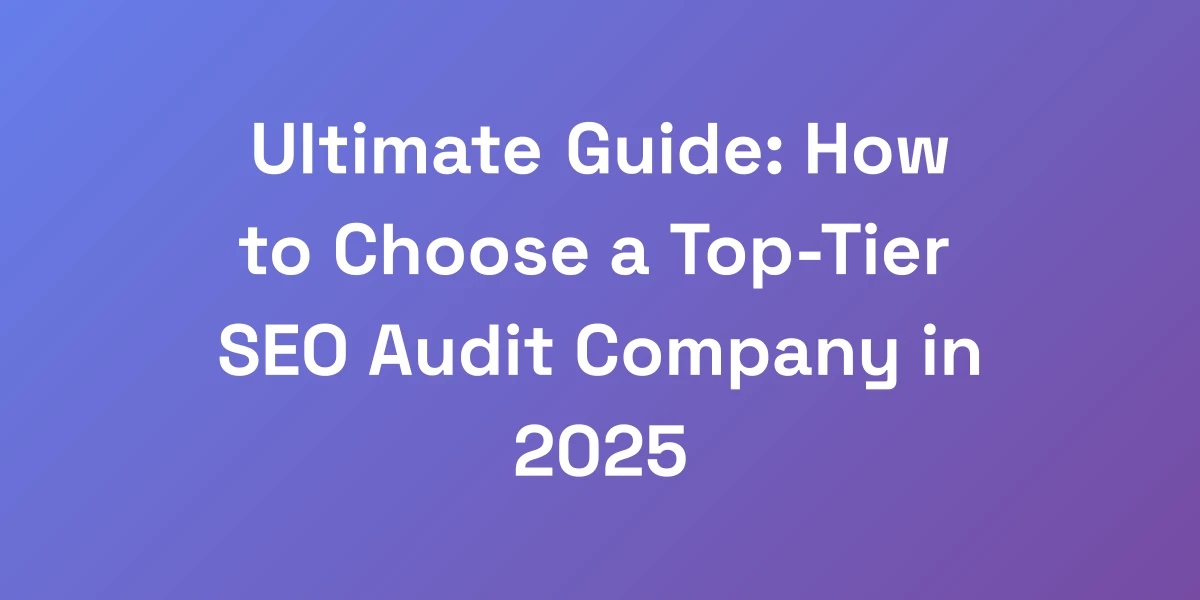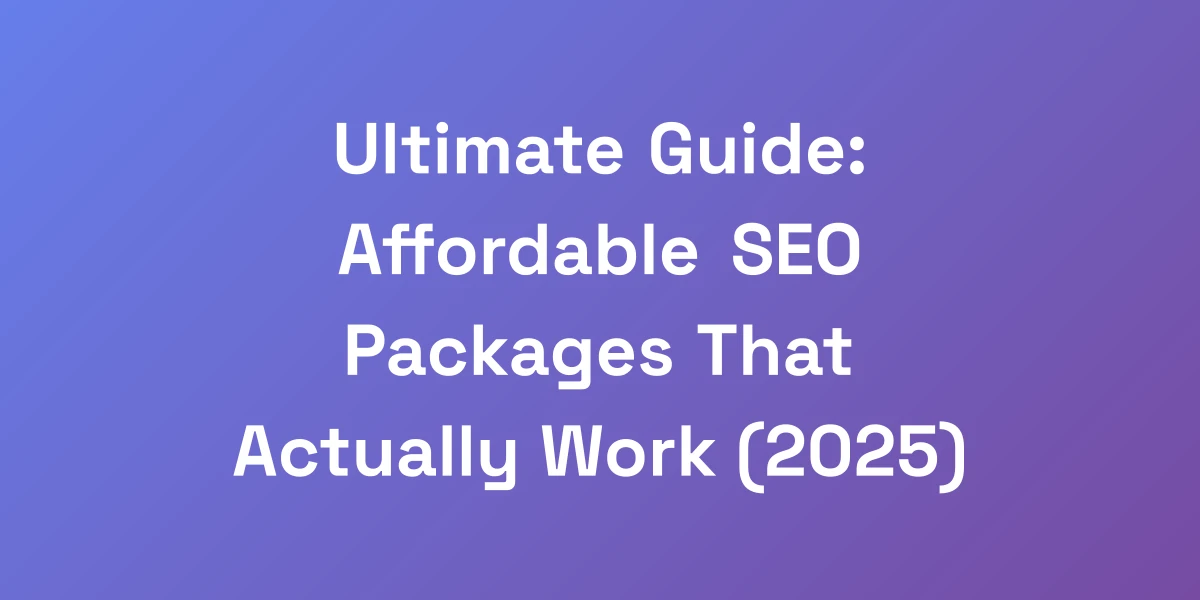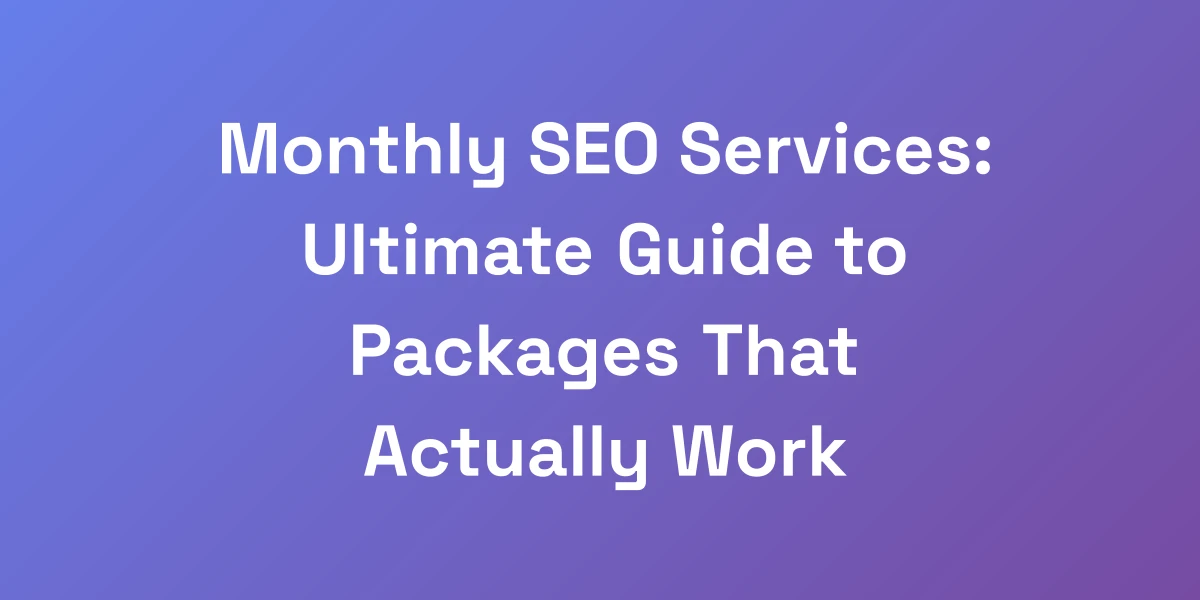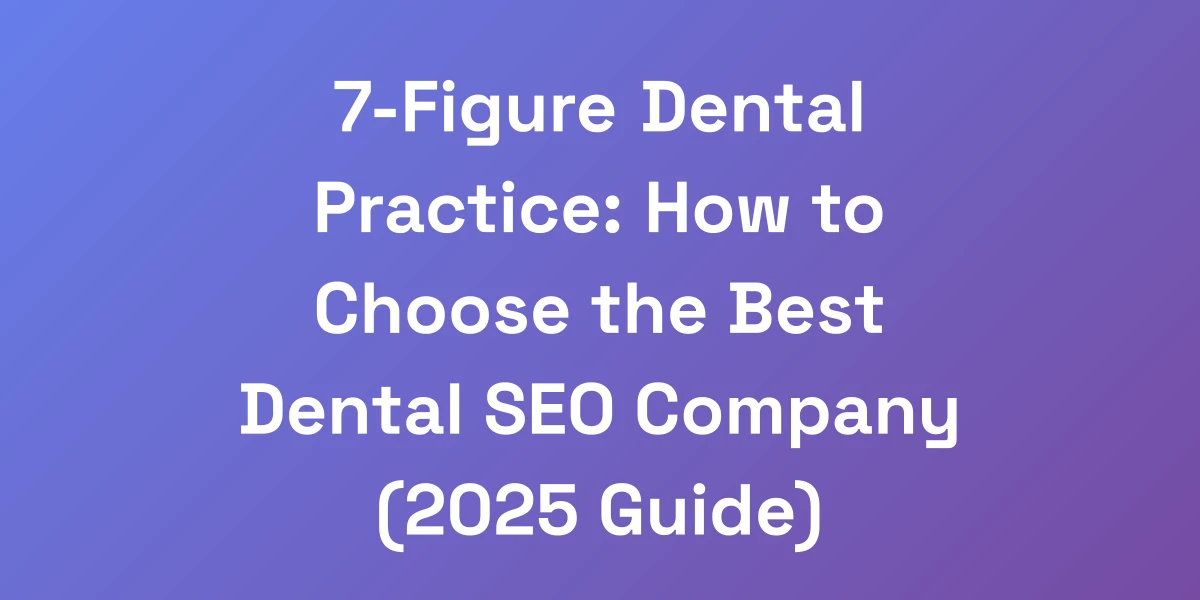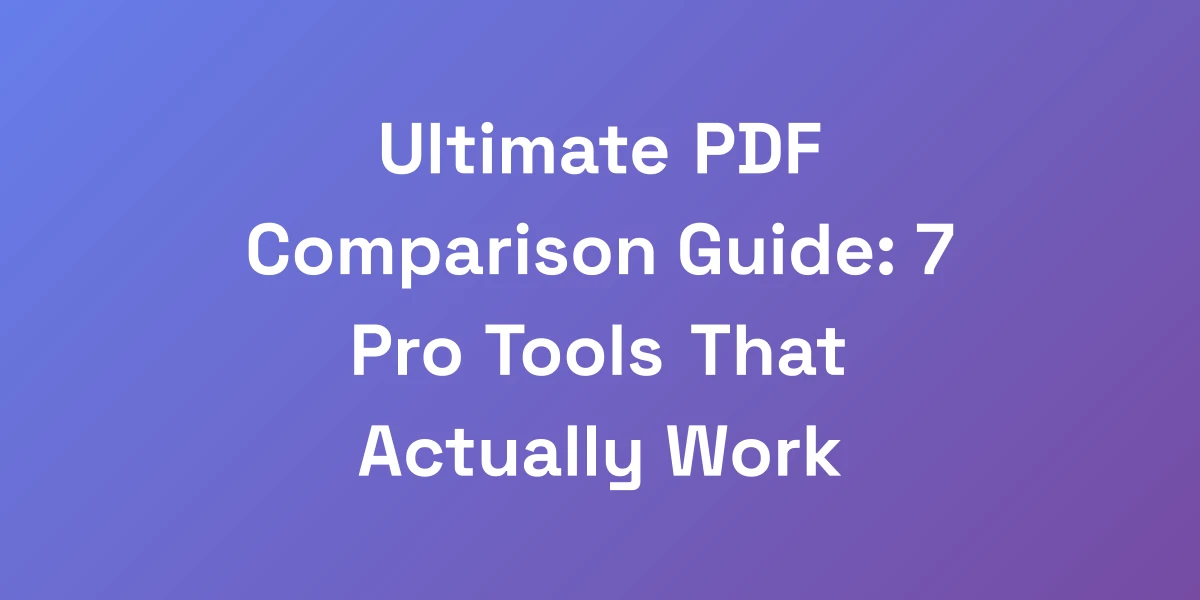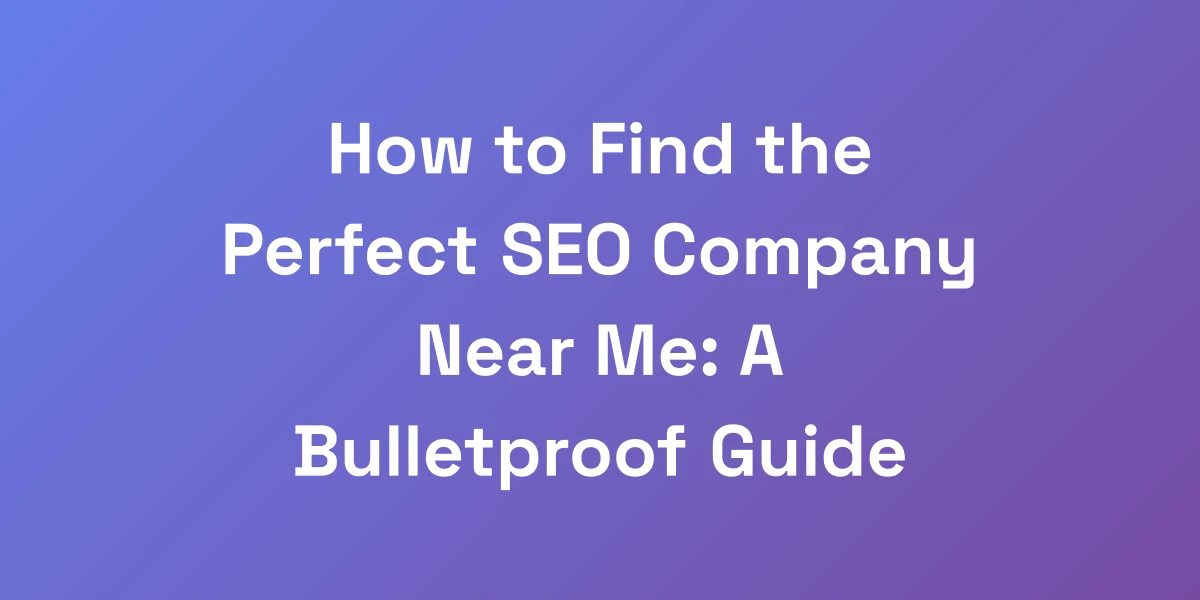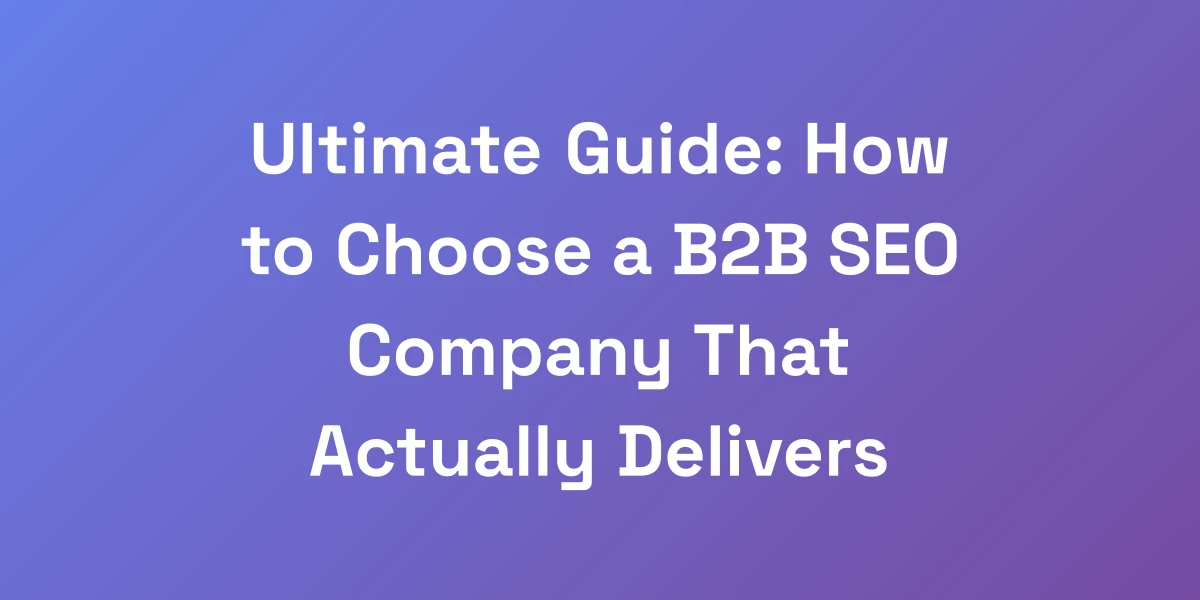
Ultimate Guide: How to Choose a B2B SEO Company That Actually Delivers
Feb 27, 2025 | By zishansami102@gmail.com
Why Most B2B Companies Fail at Picking the Right SEO Partner
Let’s get real for a second – choosing a B2B SEO company is like navigating a minefield of promises and buzzwords. We’ve seen countless companies blow six-figure budgets on agencies that talk big but deliver squat.
Here’s the truth: 93% of B2B companies are doing SEO wrong, and it’s usually because they picked the wrong partner.
But here’s the thing – when you get it right, it’s like printing money. I’m talking predictable pipeline growth that makes your sales team actually high-five you.
Let’s break down why most companies mess this up, and how you can avoid their expensive mistakes.
Common Red Flags in B2B SEO Agencies
Spotting a subpar SEO agency early can save you a ton of headaches and money. Here are some red flags to watch out for:
- Overpromising Results: If they guarantee #1 rankings or overnight success, run the other way.
- Lack of Transparency: Agencies that are vague about their strategies or unwilling to share detailed reports are a no-go.
- One-Size-Fits-All Approach: Your business is unique. Agencies that apply generic strategies without tailoring them to your specific needs are ineffective.
- Poor Communication: If they’re slow to respond or don’t communicate regularly, it’s a sign of potential issues down the line.
- No Proven Track Record: A legitimate agency should have B2B SEO case studies and client testimonials to back up their claims.
The Real Cost of Choosing Wrong
Let’s talk numbers. Partnering with the wrong SEO agency can drain your budget without delivering results. Here’s what you might be paying for:
- Wasted Financial Resources: With average monthly SEO costs ranging from $2,000 to $10,000, poor performance can quickly add up.
- Lost Time: Time is money. While you’re stuck waiting for results, your competitors could be outpacing you.
- Damaged Reputation: Poor SEO practices can lead to penalties from search engines, harming your site’s credibility and ranking.
- Missed Opportunities: Ineffective SEO means potential leads slip through the cracks, impacting your bottom line.
In essence, a bad SEO partnership can set you back by hundreds of thousands of dollars and shave valuable years off your business growth trajectory. For small businesses, implementing affordable SEO strategies is crucial to maximize limited budgets.
Why Traditional SEO Metrics Don’t Work for B2B
Traditional SEO metrics like keyword rankings and traffic volume often miss the mark for B2B companies. Here’s why:
- Lead Quality Over Quantity: B2B thrives on high-quality leads rather than sheer numbers. Focusing solely on traffic can lead to irrelevant visitors who don’t convert.
- Long Sales Cycles: B2B sales cycles are lengthy. Metrics need to account for the extended time it takes to nurture leads to conversion.
- Complex Buyer Journeys: B2B decision-making involves multiple stakeholders. Traditional metrics don’t capture the nuanced interactions across different touchpoints.
- Revenue Attribution: It’s essential to tie SEO efforts directly to revenue. Traditional metrics often fail to show the direct impact on sales.
Focusing on these aspects ensures your SEO strategy aligns with your business objectives, driving meaningful growth.
The New Performance Indicators That Actually Matter
So, what should you be measuring? Here are the performance indicators that truly matter for B2B SEO:
- Qualified Lead Volume: Track the number of leads that meet your ideal customer profile.
- Conversion Rates: Measure how effectively your site converts visitors into leads and leads into customers.
- Revenue Growth: Directly attribute SEO efforts to revenue increases to understand ROI.
- Engagement Metrics: Monitor time on site, pages per session, and bounce rates to gauge content effectiveness.
- Account-Based Performance: Evaluate how SEO contributes to key accounts and strategic partnerships.
These indicators provide a clearer picture of how SEO impacts your bottom line, allowing you to adjust strategies for optimal results.
Case Study: How One Wrong Choice Cost $500K
Imagine pouring $500K into an SEO agency that delivers nothing but broken promises. This was the reality for a mid-sized B2B tech company we worked with.
They opted for an agency based solely on aggressive pricing and flashy testimonials. Months went by with minimal communication and stagnant metrics.
Eventually, they discovered that the agency was using black-hat techniques that not only failed to improve their rankings but also led to search engine penalties.
The fallout? Significant drop in organic traffic, loss of leads, and a damaged online reputation. The company had to overhaul their SEO strategy from scratch, costing even more time and resources to recover.
This case underscores the importance of due diligence and choosing an SEO partner that aligns with your business goals and ethical standards.
The Non-Negotiable Features of Elite B2B SEO Companies
After analyzing hundreds of B2B SEO companies and interviewing dozens of founders who’ve been through the ringer, we’ve identified the critical elements that separate the winners from the pretenders.
The best B2B SEO companies aren’t just about backlinks and keywords – they’re strategic partners who understand your entire revenue ecosystem.
They have proven frameworks for turning organic traffic into qualified leads, and they’re not afraid to show you their playbook.
Here’s what the top 1% of B2B SEO companies have in common.
Industry-Specific Content Creation Capabilities
Understanding your industry is paramount. Elite B2B SEO companies invest time in mastering the nuances of your sector, enabling them to create content that resonates with your target audience.
- Deep Knowledge: They possess in-depth knowledge of industry-specific terminology and trends.
- Targeted Content: Create content that addresses the unique pain points and needs of your audience.
- Thought Leadership: Develop authoritative content that positions your company as a leader in the field.
This specialized approach ensures that your content not only attracts visitors but also engages and converts them.
Technical SEO Infrastructure Understanding
A robust technical SEO foundation is non-negotiable. Top-tier agencies excel in:
- Site Speed Optimization: Ensuring fast loading times for better user experience and higher rankings.
- Mobile Usability: Guaranteeing that your site performs seamlessly across all devices.
- Structured Data Implementation: Enhancing search engine comprehension through proper schema markup.
- Security Protocols: Maintaining HTTPS and other security measures to build trust with both users and search engines.
They conduct regular technical audits to identify and rectify issues that could hinder your SEO performance, leveraging enterprise technical SEO best practices. Additionally, utilizing AI-powered auto SEO software can further streamline and enhance these processes.
Account-Based Marketing Integration
Integrating SEO with Account-Based Marketing (ABM) strategies ensures that your efforts are aligned with your sales goals.
- Personalized Targeting: Tailor SEO strategies to target specific high-value accounts.
- Content Alignment: Develop content that addresses the specific needs and challenges of your target accounts.
- Collaborative Approach: Work closely with your sales team to ensure SEO efforts support their objectives.
This synergy between SEO and ABM drives more effective lead generation and higher conversion rates.
Revenue Attribution Models
Understanding the direct impact of SEO on revenue is crucial. Elite agencies employ sophisticated revenue attribution models to:
- Track Conversions: Assign value to each touchpoint in the buyer’s journey.
- Measure ROI: Calculate the return on investment for various SEO activities.
- Optimize Strategies: Use data-driven insights to refine and enhance SEO tactics.
These models provide clarity on how SEO contributes to your overall revenue, enabling more informed decision-making.
Proprietary Growth Frameworks
Top B2B SEO companies often have proprietary frameworks that guide their strategies and ensure consistent results. This includes leveraging automated SEO optimization to maximize efficiency and results.
- Customized Methodologies: Tailored approaches that align with your business objectives.
- Scalable Processes: Frameworks that can grow with your business, maintaining effectiveness as you expand.
- Continuous Improvement: Regularly updated strategies based on the latest SEO trends and algorithm changes.
These frameworks provide a structured path to achieving your SEO goals, ensuring sustained growth and success. Many of these frameworks integrate AI SEO tools to enhance strategy efficiency.
Case Study Success Portfolio
The best B2B SEO companies have a portfolio packed with success stories across various industries.
- Diverse Clientele: Demonstrates expertise in different sectors, showcasing versatility and adaptability.
- Proven Results: Detailed case studies that highlight significant improvements in rankings, traffic, and conversions.
- Client Testimonials: Positive feedback from satisfied clients that attest to the agency’s effectiveness and reliability.
A strong success portfolio is a testament to an agency’s capability to deliver tangible results, making it easier for you to trust their expertise.
The Secret Sauce: What Top B2B SEO Companies Do Differently
Here’s what nobody tells you about successful B2B SEO: it’s not about gaming Google – it’s about becoming the undeniable authority in your space.
The best B2B SEO companies don’t just focus on rankings; they build complete digital ecosystems that turn your website into a lead-generation machine. Moreover, they utilize AI SEO tools that actually work to boost their effectiveness.
We’ve seen companies 10x their pipeline by implementing these strategies correctly.
Let’s dive into the actual techniques that separate seven-figure agencies from the wannabes.
Entity-First SEO Approach
Traditional SEO focuses heavily on keywords, but the entity-first approach takes it a step further by:
- Building a Knowledge Graph: Structuring your content to establish clear relationships between entities.
- Enhancing Relevance: Ensuring that your content is contextually relevant and authoritative.
- Improving Comprehension: Making it easier for search engines to understand and index your content.
This approach not only improves rankings but also enhances the overall quality and relevance of your content.
Topic Cluster Methodology
The topic cluster model organizes your content around central themes, enhancing both user experience and SEO performance.
- Core Topics: Identify main themes that are highly relevant to your business and audience.
- Cluster Content: Develop supporting content that delves deeper into specific aspects of the core topics.
- Internal Linking: Strategically link cluster content to the core topic to improve site structure and SEO.
This methodology creates a coherent content structure that search engines love and users find invaluable.
Intent-Based Content Mapping
Understanding and aligning with user intent is crucial. Elite B2B SEO companies excel in:
- Identifying Intent: Categorizing content based on informational, navigational, commercial, and transactional intents.
- Tailoring Content: Creating content that directly addresses the specific needs and questions of your audience at each stage of their journey.
- Optimizing for Intent: Ensuring that your content is optimized to satisfy the identified intent, improving engagement and conversions.
This focus on intent ensures that your content delivers true value, driving higher engagement and better conversion rates.
Enterprise-Level Technical Optimization
Technical SEO is the backbone of a successful strategy. Top agencies ensure:
- Advanced Site Audits: Comprehensive audits that identify and fix deep-seated technical issues.
- Scalability: Implementing solutions that can handle large volumes of content and traffic without compromising performance.
- Automation: Utilizing tools and scripts to automate routine tasks, freeing up time for more strategic initiatives.
These practices ensure that your website is not only optimized for search engines but also offers a seamless user experience.
Thought Leadership Development
Positioning your brand as a thought leader is a game-changer. Elite SEO companies support this by:
- Creating High-Quality Content: Developing in-depth articles, whitepapers, and case studies that showcase your expertise.
- Engaging with Industry Influencers: Building relationships with key players to amplify your reach and credibility.
- Consistent Branding: Ensuring that all content aligns with your brand’s voice and values.
Thought leadership not only boosts your SEO but also builds trust and authority with your audience.
Cross-Channel Integration Strategies
SEO doesn’t exist in a vacuum. Top agencies integrate SEO with other marketing channels to maximize impact:
- Social Media: Leveraging social platforms to distribute content and drive traffic.
- Email Marketing: Using SEO insights to craft targeted email campaigns.
- Paid Advertising: Complementing organic efforts with strategic pay-per-click campaigns.
This holistic approach ensures that all marketing efforts are aligned and reinforce each other, amplifying overall results.
How to Evaluate and Compare B2B SEO Companies
After you’ve dropped $50K on the wrong agency (like we’ve seen many do), you learn to ask the right questions.
We’re going to share the exact evaluation framework that’s saved our clients millions in wasted spend.
The key is looking beyond the typical case studies and testimonials – you need to dig into their actual processes and results.
Here’s the step-by-step system to separate the real players from the smooth-talking pretenders.
The 15-Point Assessment Checklist
Use this checklist to thoroughly evaluate potential SEO partners:
- Do they have industry-specific experience?
- Can they provide detailed case studies?
- What is their approach to technical SEO?
- How do they integrate SEO with other marketing channels?
- What are their content creation capabilities?
- Do they use a proprietary growth framework?
- How transparent are they with reporting?
- What is their communication frequency?
- Can they provide references from similar businesses?
- What are their pricing models?
- Do they offer a clear ROI measurement?
- How do they handle account-based marketing integration?
- What security measures do they implement?
- Do they conduct regular technical audits?
- What is their approach to thought leadership development?
This comprehensive checklist ensures you cover all critical aspects before making a decision.
Key Performance Metrics to Request
Don’t settle for vague promises. Ask for specific metrics that demonstrate their effectiveness:
- Keyword Rankings: Current and historical data on keyword performance.
- Organic Traffic Growth: Trends and growth rates over time.
- Conversion Rates: How SEO efforts translate into leads and sales.
- Revenue Attribution: Data showing how SEO contributes to revenue.
- Engagement Metrics: Time on site, bounce rates, and pages per session.
These metrics provide a clear picture of how the agency drives tangible results.
Red Flags in Proposal Documents
Carefully review proposals for warning signs that the agency might not be the right fit:
- Vague Strategies: Lack of detailed plans and clear methodologies.
- Unrealistic Timelines: Promises of immediate results without acknowledging the time SEO takes.
- Hidden Fees: Extra costs not clearly outlined in the proposal.
- No Customization: Generic strategies that don’t address your specific needs.
- Overemphasis on Rankings: Focusing solely on rankings rather than overall business goals.
Identifying these red flags early can prevent future disappointments.
Client Reference Verification Process
Don’t take the agency’s word for it. Verify their claims by:
- Contacting Past Clients: Speak directly with their clients to understand their experiences.
- Asking Specific Questions: Inquire about results, communication, and overall satisfaction.
- Reviewing Testimonials: Look for genuine feedback and success stories.
This due diligence ensures you’re partnering with a credible agency.
Pricing Model Analysis
Understand how the agency structures its pricing to ensure it aligns with your budget and expectations:
- Transparency: Clear breakdown of costs and services included.
- Flexibility: Ability to customize packages based on your needs.
- Value for Money: Assess if the pricing is justified by the services and results offered.
Comparing pricing models helps you choose an agency that offers the best balance between cost and value.
Service Level Agreement Must-Haves
Your SLA should clearly outline expectations and commitments. Ensure it includes:
- Performance Metrics: Specific KPIs that the agency is accountable for.
- Reporting Frequency: How often you’ll receive updates and reports.
- Responsiveness: Guaranteed response times for queries and issues.
- Termination Clauses: Clear terms for ending the partnership if necessary.
A robust SLA protects your interests and ensures accountability from the agency.
Making the Final Decision: A Data-Driven Approach
Let’s cut through the BS and get to what really matters: ROI.
The best B2B SEO company for you is the one that can prove they’ve moved the needle for businesses similar to yours.
I’m talking concrete numbers, not vanity metrics.
Here’s your playbook for making a decision that will have your CFO sending you thank-you notes instead of budget cut threats.
Let’s break down the exact process for making a choice you won’t regret in 6 months.
Creating Your Decision Matrix
A decision matrix helps you objectively evaluate potential agencies based on key criteria.
- List Your Criteria: Identify what’s most important – experience, pricing, services, etc.
- Assign Weights: Determine the importance of each criterion.
- Score Each Agency: Rate each agency against your criteria.
This structured approach ensures you consider all vital factors before making a decision.
ROI Calculation Framework
Understanding the return on your SEO investment is crucial. Here’s a simple framework:
- Define Goals: Establish what success looks like – leads, sales, revenue.
- Calculate Gains: Measure the revenue generated from SEO efforts.
- Subtract Costs: Factor in all expenses related to the SEO campaign.
- Compute ROI: Use the formula ((Gain from Investment – Cost of Investment) / Cost of Investment) x 100.
This formula provides a clear picture of the financial benefits of your SEO investment.
Risk Assessment Guidelines
Every investment comes with risks. Assess potential risks by:
- Evaluating Agency Stability: Ensure the agency has a solid reputation and stability.
- Identifying Potential Pitfalls: Anticipate challenges like algorithm changes or service disruptions.
- Mitigation Strategies: Develop plans to address and overcome potential risks.
Proactively managing risks helps safeguard your investment and ensures smoother execution.
Timeline and Milestone Planning
Establish a clear timeline with specific milestones to track progress:
- Set Clear Deadlines: Define when key tasks and goals should be achieved.
- Monitor Progress: Regularly review milestones to ensure the project is on track.
- Adjust as Needed: Be flexible to adapt the plan based on performance and changes.
Having a structured timeline keeps the project focused and ensures timely delivery of results.
Contract Negotiation Tips
When finalizing the contract, keep these tips in mind:
- Be Clear on Deliverables: Ensure the contract specifies what the agency will deliver.
- Discuss Payment Terms: Clarify payment schedules and terms upfront.
- Include Performance Clauses: Set expectations for performance metrics and outcomes.
- Negotiate Flexibility: Ensure there’s room to adjust services as needed.
A well-negotiated contract protects your interests and sets the foundation for a successful partnership.
Implementation Roadmap
Once the decision is made, establish a clear implementation roadmap:
- Kickoff Meeting: Align on goals, timelines, and responsibilities.
- Strategy Development: Collaborate on the detailed SEO plan.
- Execution: Begin implementing SEO tactics as per the agreed strategy.
- Regular Check-Ins: Schedule consistent meetings to review progress and make adjustments.
A well-defined roadmap ensures smooth implementation and continuous progress towards your SEO goals.
Conclusion
Choosing the right B2B SEO company is a game-changer for your business. It’s not just about improving rankings; it’s about building a strategic partnership that drives tangible results.
Remember, the right SEO partner understands your business, aligns with your goals, and delivers measurable ROI.
Don’t settle for less. Use the frameworks and tips we’ve shared to make an informed decision that propels your business forward.
Ready to take the next step? Start evaluating potential SEO partners today and set your business on the path to sustained growth.
Have any questions or need further advice? Drop a comment below and let’s continue the conversation!
